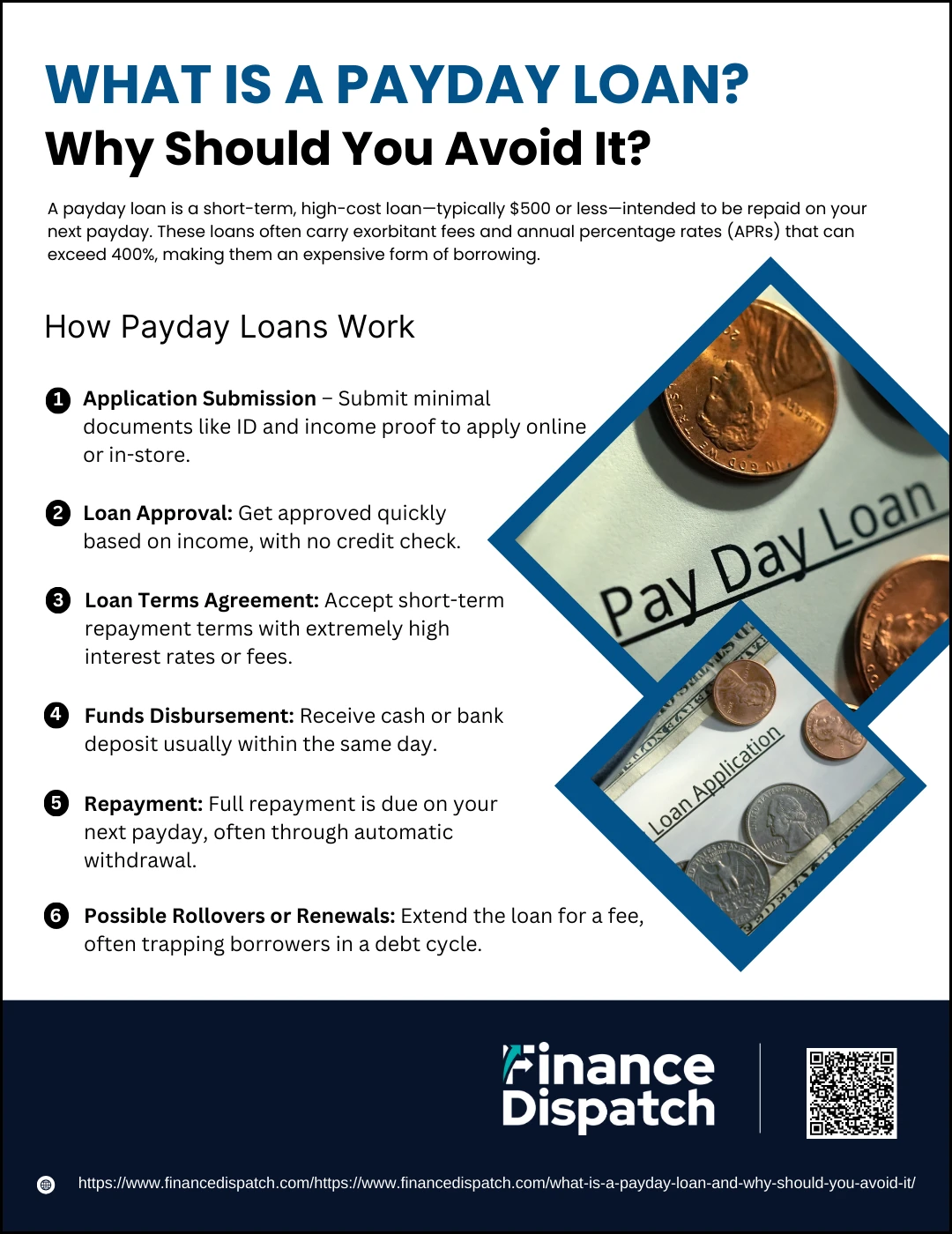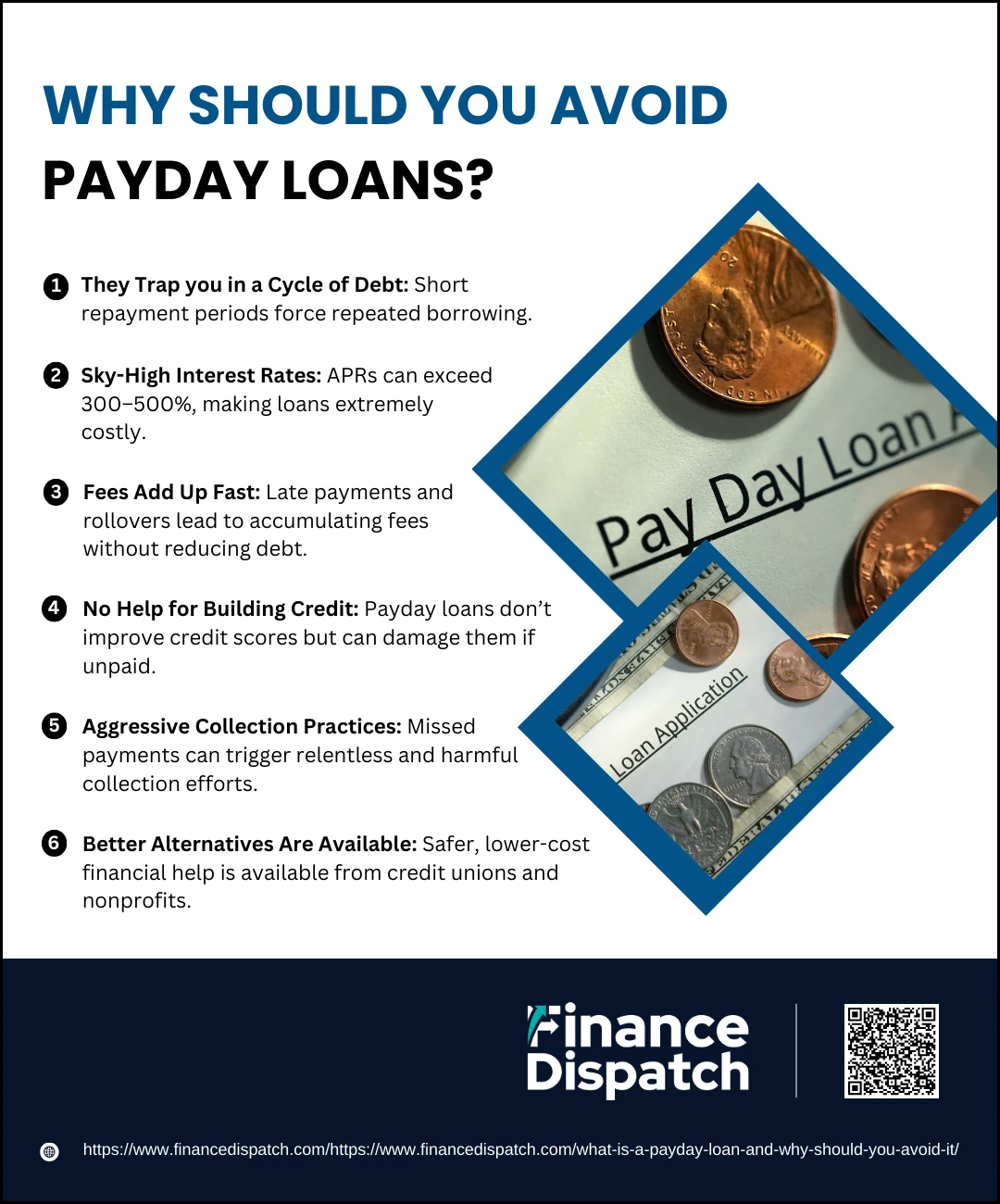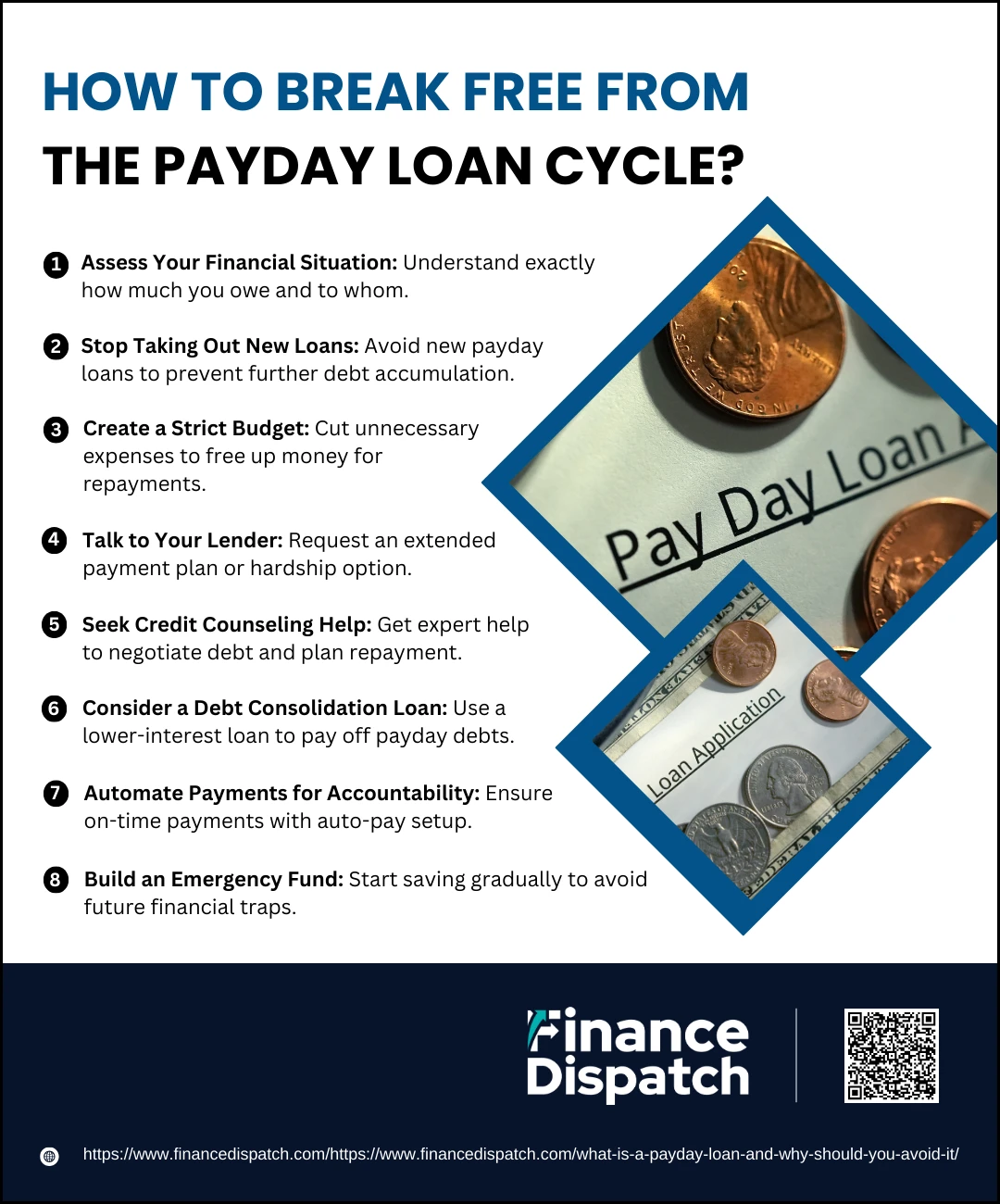In times of financial distress, a payday loan might seem like a quick and easy solution. Marketed as short-term loans designed to help you make it to your next paycheck, they are often available without credit checks and with minimal paperwork. However, what seems like a lifeline can quickly turn into a financial trap. Behind the convenience lies a cycle of high fees, soaring interest rates, and long-term debt that can be difficult to escape. This article explores what payday loans are and why avoiding them could be one of the best financial decisions you make.
What is a Payday Loan?
A payday loan is a short-term, high-interest loan typically designed to cover urgent expenses until your next paycheck arrives. These loans are usually small—often ranging from $100 to $1,000—and are marketed as fast cash solutions for emergencies like medical bills, car repairs, or overdue utilities. Borrowers are often required to repay the full amount, plus fees and interest, within two to four weeks. Unlike traditional loans, payday lenders usually don’t require good credit; instead, they rely on proof of income and a postdated check or electronic access to your bank account. While they may appear helpful in a pinch, payday loans come with significant financial risks that many borrowers don’t fully understand until it’s too late.
 How Payday Loans Work
How Payday Loans Work
Payday loans are marketed as fast fixes for urgent financial needs, offering instant access to cash with few requirements. While the process may seem straightforward, the terms are often structured in a way that traps borrowers in cycles of debt. Let’s take a closer look at each stage of how payday loans typically work:
1. Application Submission
The process begins when you submit an application, either at a physical payday loan store or through an online lender. Unlike traditional loans that may require extensive documentation, payday lenders usually ask for a government-issued ID, proof of a steady income (such as pay stubs or bank statements), and access to your checking account. The simplicity and speed of the application process are part of what makes these loans appealing—but also risky, as there’s little scrutiny into your ability to repay.
2. Loan Approval
Approval is often granted within minutes, especially online. Because payday lenders usually don’t conduct thorough credit checks, approval is based mostly on proof that you have a regular source of income. This quick approval process can be tempting for people facing emergency expenses or with poor credit histories, but it bypasses the crucial assessment of your long-term financial health.
3. Loan Terms Agreement
Once approved, you’ll be presented with the loan terms. This includes the loan amount, the due date (often aligned with your next payday), and the total repayment amount, which includes extremely high interest or flat fees. For example, a $300 loan might come with a $45 fee, which doesn’t seem huge until you realize it translates to an annual percentage rate (APR) of nearly 400% or more.
4. Funds Disbursement
After signing the agreement, the funds are disbursed. This could be in cash (at a storefront) or directly deposited into your bank account (online). The entire process—application, approval, and disbursement—can take less than a day, which is why many turn to payday loans when in urgent need of money.
5. Repayment
Repayment is typically due on your next payday. The lender either withdraws the amount directly from your bank account or cashes a postdated check you provided. If your account doesn’t have enough funds, you could incur overdraft charges from your bank, along with late fees from the lender. Some lenders may even attempt multiple withdrawals, worsening the financial damage.
6. Possible Rollovers or Renewals
If you can’t repay the loan in full on the due date, the lender may allow you to “roll over” or renew the loan. This means you pay an additional fee to extend the loan term. While this gives temporary relief, it increases the total cost dramatically and can lead to repeated borrowing. Many borrowers fall into a cycle where they continuously pay fees without ever reducing the principal amount.
The Hidden Costs of Payday Loans
At first glance, payday loans may appear to offer a simple solution to urgent financial needs. The advertised fees often seem small compared to traditional interest rates, and the process is quick and easy. However, beneath the surface lies a complex web of hidden costs that can turn a short-term loan into a long-term financial burden. These costs aren’t always clear upfront, but they can have a devastating impact on your finances.
1. Exorbitant Interest Rates: Payday loans often carry annual percentage rates (APRs) exceeding 300% to 500%, far higher than traditional loans or credit cards. This means a small loan can cost you hundreds of dollars in a short period.
2. Finance Charges That Add Up Quickly; Lenders charge flat fees per $100 borrowed—often $15 to $30. If you borrow $300, you might owe $345 or more within two weeks. These fees don’t reduce the principal, leading to repeat borrowing.
3. Rollovers That Multiply Debt: If you can’t repay the loan on time, lenders may offer a rollover—extending your due date for another fee. Each rollover adds more cost without reducing your original debt, trapping you in a cycle.
4. Non-Sufficient Funds (NSF) Fees: If the lender attempts to withdraw payment and your account lacks funds, your bank may charge NSF fees. These can stack up quickly alongside late fees from the lender.
5. Debt Collection and Legal Costs: Unpaid payday loans may be sent to collections, triggering aggressive tactics and additional charges. In some cases, legal action could follow, compounding your financial stress.
6. Negative Impact on Credit and Finances: Although payday lenders don’t typically report to credit bureaus, defaults or collections can eventually appear on your credit report. Additionally, frequent payday borrowing can limit access to better loan options in the future.
 Why Should You Avoid Payday Loans?
Why Should You Avoid Payday Loans?
Although payday loans are marketed as quick fixes for short-term financial problems, they often lead to much bigger and longer-lasting issues. What may seem like a convenient solution can quickly spiral into a financial nightmare. Below are several important reasons why avoiding payday loans is a wise financial decision:
1. They Trap You in a Cycle of Debt
Because payday loans require full repayment within a very short period—usually two to four weeks—many borrowers are unable to repay the total amount on time. To avoid defaulting, they take out a new payday loan to cover the old one. This rollover process piles up fees and interest, locking borrowers into a continuous cycle of debt that becomes increasingly harder to escape.
2. Sky-High Interest Rates
One of the biggest drawbacks of payday loans is the extraordinarily high annual percentage rates (APRs). It’s not uncommon for payday loans to have APRs of 300% to 500%, and in some cases even higher. What seems like a small fee for a short-term loan translates into huge costs over time.
3. Fees Add Up Fast
Payday lenders often charge between $15 and $30 for every $100 borrowed. If the borrower can’t repay the loan on time, the fees accumulate quickly. Worse still, each extension or renewal requires another fee, but doesn’t reduce the principal—meaning you’re paying more while your original debt remains untouched.
4. No Help for Building Credit
Unlike credit cards or personal loans from a bank, payday lenders typically don’t report on-time payments to credit bureaus. So, even if you manage to pay the loan back in full, it won’t improve your credit score. However, if the loan goes unpaid and ends up in collections, it could harm your credit history significantly.
5. Aggressive Collection Practices
Borrowers who fall behind may face aggressive and persistent collection efforts. Some payday lenders and their collection agencies may bombard you with calls, send threatening letters, or even take legal action. In many cases, they will attempt to withdraw money from your account multiple times, potentially leading to overdraft fees from your bank.
6. Better Alternatives Are Available
Fortunately, payday loans aren’t your only option. Many credit unions offer small-dollar loans at much lower interest rates. Local charities and nonprofit organizations also provide emergency financial assistance. Some creditors may agree to flexible payment plans if you’re upfront about your situation. These alternatives can help you manage your financial problems without the dangerous consequences of payday loans.
Real-Life Consequences of Using Payday Loans
Behind the promise of fast cash, payday loans often lead to very real and painful consequences for borrowers. While lenders emphasize ease and speed, they rarely highlight the long-term financial strain these loans can cause. For many people, especially those already living paycheck to paycheck, the fallout can be severe and lasting. Below are some of the real-life consequences individuals have experienced after taking out payday loans:
1. Chronic Debt Cycles
Many borrowers find themselves trapped in a loop of borrowing, repaying, and re-borrowing. What starts as a single loan to cover an emergency can turn into multiple loans that are difficult to pay off, leading to months or even years of financial struggle.
2. Bank Overdrafts and Penalties
When payday lenders attempt automatic withdrawals from your bank account, it can result in insufficient funds and overdraft fees. These penalties add to your financial burden and can even lead to your bank account being closed.
3. Damaged Credit Scores
If a payday loan goes unpaid and is sent to collections, it can negatively impact your credit report. This makes it harder to qualify for traditional loans, rent housing, or even secure employment in some industries.
4. Stress and Mental Health Struggles
The constant pressure of debt, harassment from collectors, and the feeling of financial hopelessness can lead to anxiety, depression, and other mental health issues.
5. Loss of Financial Independence
Ongoing dependence on payday loans can prevent you from saving money, making long-term financial plans, or building a stable future. Each loan takes away a piece of your financial freedom.
6. Legal Action and Wage Garnishment
In some cases, unpaid payday loans may lead to lawsuits. If the lender wins in court, they can garnish your wages, meaning a portion of your paycheck is automatically withheld to repay the debt.
Alternatives to Payday Loans
If you’re in a financial bind, it’s important to know that safer and more affordable options exist beyond payday loans. While payday lenders may seem like the quickest solution, their high fees and short repayment terms can cause more harm than good. Fortunately, there are several alternatives that offer relief without the same risks. These options can help you cover emergency expenses while protecting your financial health.
| Alternative | Description | Pros | Cons |
| Credit Union Payday Alternative Loans (PALs) | Small-dollar loans offered by federal credit unions with capped fees and interest rates. | Low interest; regulated; longer repayment terms | Requires credit union membership |
| Payment Plans with Creditors | Many utility companies, hospitals, and service providers offer payment extensions or installment plans. | No interest; flexible terms | Requires upfront communication and approval |
| Personal Loans from Banks or Online Lenders | Traditional installment loans with longer terms and lower APRs than payday loans. | Lower rates; fixed monthly payments | May require good credit or co-signer |
| Borrowing from Friends or Family | Informal loans from trusted people in your life. | No interest or flexible repayment | Can strain personal relationships if not repaid responsibly |
| Local Charities or Nonprofits | Many communities offer emergency financial aid for housing, food, or utilities. | No repayment required; helps those most in need | May have eligibility requirements or limited funding |
| Side Gigs or Selling Unused Items | Short-term income boost through freelance work or selling belongings online. | No borrowing needed; builds independence | Takes time and effort to generate needed funds |
 How to Break Free from the Payday Loan Cycle
How to Break Free from the Payday Loan Cycle
Payday loans may feel like the only option when you’re financially overwhelmed, but escaping their grip is possible with a focused plan and the right support. Many borrowers find themselves stuck in a loop of re-borrowing just to stay afloat, but you can take back control of your finances. Breaking the cycle requires both immediate action and long-term financial changes. Here’s how you can start turning things around:
1. Assess Your Financial Situation
Take an honest look at how much you owe in payday loans, including principal, fees, and interest. Make a list of all loans, their due dates, and repayment terms. Understanding the total amount you’re up against is the first step in forming a realistic debt reduction plan.
2. Stop Taking Out New Loans
It’s tempting to take another payday loan to cover an existing one, but this only deepens the debt trap. Commit to stopping new borrowing. Seek help from family, friends, or local organizations if you need immediate financial relief instead.
3. Create a Strict Budget
Develop a detailed budget that tracks all your income and expenses. Identify non-essential spending you can reduce or eliminate. Even small cuts—like skipping takeout or limiting subscriptions—can free up money to pay down debt faster.
4. Talk to Your Lender
Contact your payday lender and ask about extended repayment plans (EPPs) or hardship programs. Some states require lenders to offer more manageable repayment options if requested before the loan is due.
5. Seek Credit Counseling Help
Non-profit credit counselors offer free or low-cost advice and can work with you to create a debt management plan. They can also negotiate with payday lenders on your behalf to lower fees or extend payment timelines.
6. Consider a Debt Consolidation Loan
If you qualify, a personal loan from a credit union or online lender with a lower APR can help you pay off all payday loans at once. This leaves you with one manageable monthly payment and reduces the total interest paid over time.
7. Automate Payments for Accountability
Setting up auto-pay for your loan or repayment plan ensures consistent, on-time payments and prevents missed deadlines that could lead to more fees or renewed borrowing.
8. Build an Emergency Fund
Once you’re out of debt, even a small emergency fund can keep you from falling back into the payday loan trap. Save a little each week—even $10 adds up—and aim for at least $500 over time to cover small unexpected expenses.
Conclusion
Payday loans might seem like a fast fix during a financial emergency, but they often lead to more harm than help. With sky-high interest rates, hidden fees, and the risk of falling into a relentless debt cycle, these loans can quickly turn a temporary problem into a long-term crisis. Fortunately, there are safer and more sustainable alternatives available—options that empower you rather than trap you. By understanding how payday loans work and taking proactive steps to manage your finances, you can protect yourself from their pitfalls and build a more secure financial future. Making informed decisions today can save you from unnecessary stress and hardship tomorrow.



